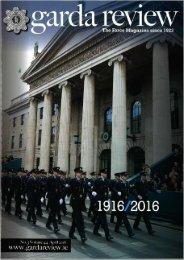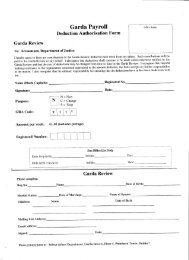Conference Report 2016
Table of contents contains links on page 5. It can be used to skip through chapters.
Table of contents contains links on page 5. It can be used to skip through chapters.
You also want an ePaper? Increase the reach of your titles
YUMPU automatically turns print PDFs into web optimized ePapers that Google loves.
Section 1: Pay and Allowances<br />
3.10 In effect, arising from these statutory obligations<br />
and the reality of day-to-day policing, gardaí serve<br />
as:<br />
• guardians of the peace of Ireland with a duty to<br />
enforce a wide range of laws and to maintain<br />
order,<br />
• the interface between the law and order of the<br />
State and the general public,<br />
• the most visible public face of the authority of the<br />
State for most of its citizens.<br />
3.11 In practice, the daily work of gardaí is extremely<br />
wide ranging and (though not limited to) can<br />
embrace the following:<br />
• protection of life, property and the civil rights of<br />
individuals<br />
• prevention, detection, and investigation of<br />
violations of laws involving accidents, crimes, and<br />
misconduct<br />
• identification and arrest of suspects<br />
• advising persons under arrest of their rights<br />
• assisting in the prosecution of criminals<br />
• assisting persons in emergencies<br />
• being obliged to exhibit personal courage in<br />
potentially dangerous situations<br />
• serving to address the increasingly international<br />
dimension of policing work (for example, through<br />
developments at Interpol, Schengen, the internet,<br />
immigration, paedophilia, globalised criminal<br />
networks).<br />
3.12 The calibre of the work of the gardaí impinges upon<br />
their status within, and trust among, the community.<br />
It also permeates the level of acceptance of law<br />
enforcement by citizens, the extent of crime<br />
prevention and detection and the degree to which<br />
citizens are prepared to cooperate with the gardaí.<br />
They also provide an example to the community in<br />
their conformance with the law, afford the public a<br />
sense of personal security and that their rights and<br />
property are safeguarded.<br />
3.13 A uniformed garda on roster duty carries out<br />
fundamental tasks on a recurring basis. These may<br />
include though are not limited to:<br />
• patrols on foot, cars, motor-bikes and bicycles,<br />
which by the physical presence of gardaí help<br />
crime prevention and act as a deterrent to the<br />
infringement of laws, rules and regulations, whilst<br />
affording the public the all-important sense of<br />
security in their day-to-day activities<br />
• maintaining surveillance in high crime areas or of<br />
individuals suspected of criminal behaviour<br />
• being at all times alert and aware so as to observe<br />
unusual or suspicious behaviour<br />
• responding and reacting appropriately to<br />
requests from the public<br />
• inspecting and investigating incidents and<br />
disturbances, circumstances or individuals that<br />
are reported or appear unusual and suspicious<br />
• investigating crimes and law breakers<br />
• preserving crime and accident scenes<br />
• protecting evidence<br />
• searching and disarming suspects or persons<br />
being placed under arrest<br />
• interviewing victims and witnesses and<br />
questioning suspects and taking statements<br />
• keeping notes of all scenarios wherein action was<br />
taken, preparing reports on relevant or priority<br />
activities, appearing in court as witnesses in<br />
criminal prosecution and civil litigation cases<br />
• taking responsibility for traffic control and the<br />
monitoring and enforcement of traffic law offences<br />
• juvenile liaison<br />
• community relations, entailing the forging of links<br />
between gardaí and the community<br />
• developing open, friendly and potentially<br />
productive relationships with the public<br />
• operating control centres, work desks and<br />
communication networks<br />
• receiving and recording radio, telephone and<br />
personal messages and instructions associated<br />
with emergencies, complaints, violations, accidents<br />
and requests for information and assistance<br />
• crowd and riot control<br />
• analysing, evaluating, prioritising and acting on<br />
information received<br />
• seeking and executing search warrants<br />
• executing warrants for arrest<br />
• transporting prisoners<br />
• protecting delivery and collection of cash<br />
• verifying and certifying identification of<br />
individuals<br />
38th Annual Delegate <strong>Conference</strong><br />
23




